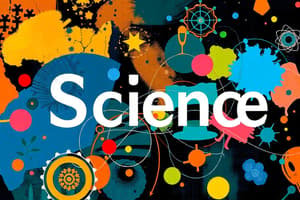Podcast
Questions and Answers
What is a fundamental component of the scientific method?
What is a fundamental component of the scientific method?
- Hypothesis (correct)
- Observation (correct)
- Conclusion (correct)
- All of the above
Which of the following branches of science focuses on the study of living organisms?
Which of the following branches of science focuses on the study of living organisms?
- Physics
- Chemistry
- Mathematics
- Biology (correct)
What is a key feature of peer review in scientific research?
What is a key feature of peer review in scientific research?
- It facilitates public dissemination of results.
- It improves the accuracy of findings. (correct)
- It is primarily a marketing tactic.
- It ensures financial support for research.
What does applied science primarily focus on?
What does applied science primarily focus on?
Which of the following best describes a scientific theory?
Which of the following best describes a scientific theory?
What is the primary goal of scientific literacy?
What is the primary goal of scientific literacy?
Which of the following is part of the physical sciences?
Which of the following is part of the physical sciences?
What is an ethical consideration in scientific research?
What is an ethical consideration in scientific research?
Flashcards are hidden until you start studying
Study Notes
Definition of Science
- Systematic enterprise that builds and organizes knowledge
- Involves observation, experimentation, and theoretical explanation of phenomena
Major Branches of Science
-
Physical Sciences
- Physics: Study of matter, energy, and the fundamental forces of nature.
- Chemistry: Study of substances, their properties, and reactions.
- Earth Science: Study of the Earth and its processes (geology, meteorology, oceanography).
-
Life Sciences
- Biology: Study of living organisms, their structure, function, growth, and evolution.
- Ecology: Study of interactions among organisms and their environment.
- Genetics: Study of heredity and variation in organisms.
-
Formal Sciences
- Mathematics: Study of numbers, quantities, shapes, and abstract concepts.
- Logic: Study of reasoning and argument principles.
- Computer Science: Study of algorithmic processes and computational systems.
-
Applied Sciences
- Focus on using scientific knowledge to develop technologies and solve practical problems.
- Examples include engineering, medicine, and environmental science.
The Scientific Method
- Observation: Noticing and describing phenomena.
- Question: Formulating a question based on observations.
- Hypothesis: Proposing a testable explanation.
- Experimentation: Testing the hypothesis through controlled experimentation.
- Analysis: Interpreting data and drawing conclusions.
- Conclusion: Confirming or refuting the hypothesis; may lead to further testing.
Importance of Science
- Advances knowledge and understanding of the universe.
- Provides technological innovations that improve quality of life.
- Informs public policy and addresses societal challenges (health, environment).
Key Concepts
- Theory: Well-substantiated explanation of an aspect of the natural world.
- Law: Statement based on repeated experimental observations that describes an inherent relationship.
- Peer Review: Process of evaluating scientific work by others in the field, ensuring validity and credibility.
Ethical Considerations
- Importance of integrity and honesty in research.
- Ethical treatment of human and animal subjects.
- Responsibility to communicate findings accurately and transparently.
Scientific Literacy
- Ability to understand, evaluate, and engage with scientific information.
- Crucial for informed decision-making in a rapidly changing world.
Definition of Science
- Science is a systematic and organized way of gathering and analyzing information about the natural world.
- It involves a process of observation, experimentation, and theoretical explanation.
Major Branches of Science
- Physical Sciences focus on the fundamental laws governing matter and energy.
- Physics investigates the nature of matter, energy, and the forces that guide their behavior.
- Chemistry explores the composition, structure, properties, and reactions of substances.
- Earth Science encompasses the study of the Earth, including geology, meteorology, and oceanography.
- Life Sciences investigate living organisms.
- Biology studies the structure, function, growth, and evolution of life forms.
- Ecology examines the interactions between organisms and their environment.
- Genetics explores the mechanisms of heredity and variation in organisms.
- Formal Sciences deal with abstract concepts.
- Mathematics explores the principles of numbers, quantities, shapes, and abstract systems.
- Logic examines the principles of reasoning and argumentation.
- Computer Science investigates algorithmic processes and computational systems.
- Applied Sciences utilize scientific knowledge to solve practical problems and develop technologies.
- Examples include engineering, medicine, and environmental science.
The Scientific Method
- The scientific method is a systematic approach to investigating phenomena.
- Observation: Observing and describing phenomena.
- Question: Formulating a question based on observations.
- Hypothesis: proposing a testable explanation for a phenomenon or observation.
- Experimentation: Testing the hypothesis through controlled experiments.
- Analysis: Analyzing the results of the experiment and drawing conclusions.
- Conclusion: Confirming or refuting the hypothesis based on analysis.
Importance of Science
- Science advances knowledge and understanding about the universe.
- It drives technological innovations, leading to improvements in quality of life.
- It informs public policy decisions, addressing societal challenges such as health and the environment.
Key Concepts in Science
- Theory: a well-substantiated explanation of an aspect of the natural world supported by substantial evidence.
- Law: a statement based on repeated, reliable observations that describes an inherent relationship between variables.
- Peer Review: A system where scientific work is evaluated by other experts in the field to ensure validity and credibility.
Ethical Considerations in Science
- Integrity and honesty are crucial in scientific research.
- Research involving human and animal subjects must be conducted ethically.
- Scientists are responsible for communicating their findings accurately and transparently.
Scientific Literacy
- Scientific literacy is the ability to understand, evaluate, and engage with scientific information.
- It is essential for informed decision-making in a rapidly changing world.
Studying That Suits You
Use AI to generate personalized quizzes and flashcards to suit your learning preferences.




